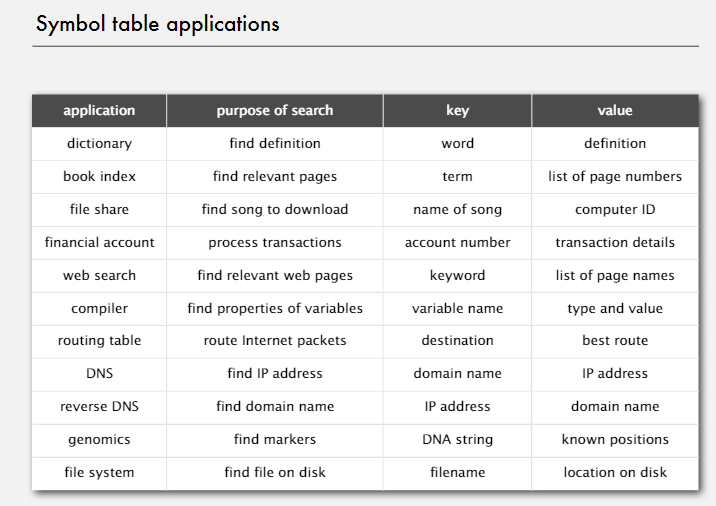符号表(Symbol Table)
简介符号表(Symbol Table)是一个非常常见的数据结构,在现实生活中应用很多。它是一个“键”—“值”对应的结构。在符号表中,存储的是键值对。通过输入键,查询对应的值。
4.6.1、符号表的定义
符号表(Symbol Table)是一个非常常见的数据结构,在现实生活中应用很多。它是一个“键”—“值”对应的结构。在符号表中,存储的是键值对。通过输入键,查询对应的值。
这个基础的数据结构,在现实生活中使用的特别多,比如字典。

4.6.2、符号表的API设计
结点类:
| 类名 | Node |
|---|---|
| 构造方法 | Node(Key key,Value value,Node next):创建Node对象 |
| 成员变量 | public Key key:存储键 public Value value:存储值 public Node next:存储下一个结点 |
符号表:
| 类名 | SymbolTable |
|---|---|
| 构造方法 | SymbolTable():创建SymbolTable对象 |
| 成员变量 | private Node head:记录首结点 private int N:记录符号表中键值对的个数 |
| 成员方法 | public Value get(Key key):根据Key找到对应的值 public void put(Key key,Value value):向符号表插入一个键值对 public void delete(Key key):删除键为key的值 public int size():获取符号表大小 |
4.6.3、符号表的设计
实现类:
package cn.test.algorithm.datastruct;
public class SymbolTable<Key, Value> {
private Node head;
private int N;
private class Node {
public Key key;
public Value value;
public Node next;
public Node(Key key, Value value, Node next) {
this.key = key;
this.value = value;
this.next = next;
}
}
public SymbolTable() {
head = new Node(null, null, null);
N = 0;
}
public int size() {
return N;
}
public void put(Key key, Value value) {
//符号表中已经存在键为key的键值对,只需要替换
Node n = head;
while (n.next != null) {
n = n.next;
if (n.key.equals(key)) {
n.value = value;
return;
}
}
//如果不存在,就需要创建新的结点
Node oldFirst = head.next;//获取第一个结点
Node newNode = new Node(key, value, oldFirst);
head.next = newNode;
N++;
}
public Value delete(Key key) {
//首先需要找到key的结点,然后将结点删除掉
Node n = head;
while (n.next != null) {
n = n.next;
if (n.key.equals(key)) {
N--;
n.next = n.next.next;
return n.value;
}
}
return null;
}
public Value get(Key key) {
//首先需要找到key的结点,然后将结点删除掉
Node n = head;
while (n.next != null) {
n = n.next;
if (n.key.equals(key)) {
return n.value;
}
}
return null;
}
}
测试类
package cn.test.algorithm.test;
import cn.test.algorithm.datastruct.SymbolTable;
public class SymbolTableTest {
public static void main(String[] args) {
SymbolTable<String, String> tables = new SymbolTable<>();
tables.put("zhangsan", "张三");
tables.put("lisi", "李四");
tables.put("wangwu", "王五");
System.out.println("----------------------------------------");
System.out.println("符号表元素个数:" + tables.size());
System.out.println(tables.get("zhangsan"));
System.out.println(tables.get("wangwu"));
System.out.println("----------------------------------------");
System.out.println(tables.delete("lisi"));
System.out.println("符号表元素个数:" + tables.size());
System.out.println("----------------------------------------");
tables.put("wangwu", "新王五");
System.out.println(tables.get("wangwu"));
}
}
测试结果:
----------------------------------------
符号表元素个数:3
张三
王五
----------------------------------------
李四
符号表元素个数:2
----------------------------------------
新王五
4.6.4、有序符号表的设计
上面我们实现的符号表是没有顺序的,那么如果要实现有序的符号表应该如何做呢?
- key必须要能进行比较,所以需要继承Comparable
- 插入的时候需要进行比较
实现类:
package cn.test.algorithm.datastruct;
public class OrderSymbolTable<Key extends Comparable<Key>, Value> {
private Node head;
private int N;
private class Node {
public Key key;
public Value value;
public Node next;
public Node(Key key, Value value, Node next) {
this.key = key;
this.value = value;
this.next = next;
}
}
public OrderSymbolTable() {
head = new Node(null, null, null);
N = 0;
}
public int size() {
return N;
}
public void put(Key key, Value value) {
//定义两个结点变量,分别记录当前结点和当前结点的上一个结点
Node curr = head.next;
Node pre = head;
while (curr != null && key.compareTo(curr.key) > 0) {
//编号当前结点
pre = curr;
curr = curr.next;
}
//如果当前结点curr与要插入的key一样
if (curr != null && key.compareTo(curr.key) == 0) {
curr.value = value;
return;
}
//如果当前结点curr与要插入key不一样,把当前结点插入到curr之前
Node newNode = new Node(key, value, curr);
pre.next = newNode;
N++;
}
public Value delete(Key key) {
//首先需要找到key的结点,然后将结点删除掉
Node n = head;
while (n.next != null) {
n = n.next;
if (n.key.equals(key)) {
N--;
n.next = n.next.next;
return n.value;
}
}
return null;
}
public Value get(Key key) {
//首先需要找到key的结点,然后将结点删除掉
Node n = head;
while (n.next != null) {
n = n.next;
if (n.key.equals(key)) {
return n.value;
}
}
return null;
}
}
测试类:
package cn.test.algorithm.test;
import cn.test.algorithm.datastruct.OrderSymbolTable;
public class OrderSymbolTableTest {
public static void main(String[] args) {
OrderSymbolTable<Integer, String> tables = new OrderSymbolTable<>();
tables.put(1, "张三");
tables.put(2, "李四");
tables.put(5, "王五");
tables.put(3, "赵六");
tables.put(4, "王琦");
}
}
通过断点查看结果。
 ps命令用于列出执行ps命令的那个时刻的进程快照。如果要动态的显示进程的信息,可以使用top命令。
ps命令用于列出执行ps命令的那个时刻的进程快照。如果要动态的显示进程的信息,可以使用top命令。 符号表(Symbol Table)是一个非常常见的数据结构,在现实生活中应用很多。它是一个“键”—“值”对应的结构。在符号表中,存储的是键值对。通过输入键,查询对应的值。
符号表(Symbol Table)是一个非常常见的数据结构,在现实生活中应用很多。它是一个“键”—“值”对应的结构。在符号表中,存储的是键值对。通过输入键,查询对应的值。 最近想把公司的内网几台服务器能通过打开一个网站的方式进行管理,所以寻求了一圈最终选择了Teleport。Teleport,这是一个使用Go语言编写的,高效的现代SSH管理工具。
最近想把公司的内网几台服务器能通过打开一个网站的方式进行管理,所以寻求了一圈最终选择了Teleport。Teleport,这是一个使用Go语言编写的,高效的现代SSH管理工具。 有时候我们需要计算某个代码块的运行时间有多长,所有语言都有相应的计算方式,那么在Python中又如何实现的呢?Python中到底又有哪些方式可以实现呢?本文我们将对这块的知识进行讨论。
有时候我们需要计算某个代码块的运行时间有多长,所有语言都有相应的计算方式,那么在Python中又如何实现的呢?Python中到底又有哪些方式可以实现呢?本文我们将对这块的知识进行讨论。 快速生成表格
快速生成表格 Electron页面跳转、浏览器打开链接和打开新窗口
Electron页面跳转、浏览器打开链接和打开新窗口 在使用Git的过程中,不想每次都输入用户名和密码去拉取代码,所以就需要保存这些信息,那么既然有保存了,就必须有清除功能。
在使用Git的过程中,不想每次都输入用户名和密码去拉取代码,所以就需要保存这些信息,那么既然有保存了,就必须有清除功能。 在Mac电脑中,如何对Git的用户名和密码进行修改呢?起初不懂Mac,所以整了很久,本文将记录如何对这个进行操作,以便后期使用。
在Mac电脑中,如何对Git的用户名和密码进行修改呢?起初不懂Mac,所以整了很久,本文将记录如何对这个进行操作,以便后期使用。 Docker编译镜像出现:fetch http://dl-cdn.alpinelinux.org/alpine/v3.12/main/x86_64/APKINDEX.tar.gz
ERROR: http://dl-cdn.alpinelinux.org/alpine/v3.12/main: temporary error (try again later)
WARNING: Ignoring APKINDEX.2c4ac24e.tar.gz: No such file or directory问题
Docker编译镜像出现:fetch http://dl-cdn.alpinelinux.org/alpine/v3.12/main/x86_64/APKINDEX.tar.gz
ERROR: http://dl-cdn.alpinelinux.org/alpine/v3.12/main: temporary error (try again later)
WARNING: Ignoring APKINDEX.2c4ac24e.tar.gz: No such file or directory问题